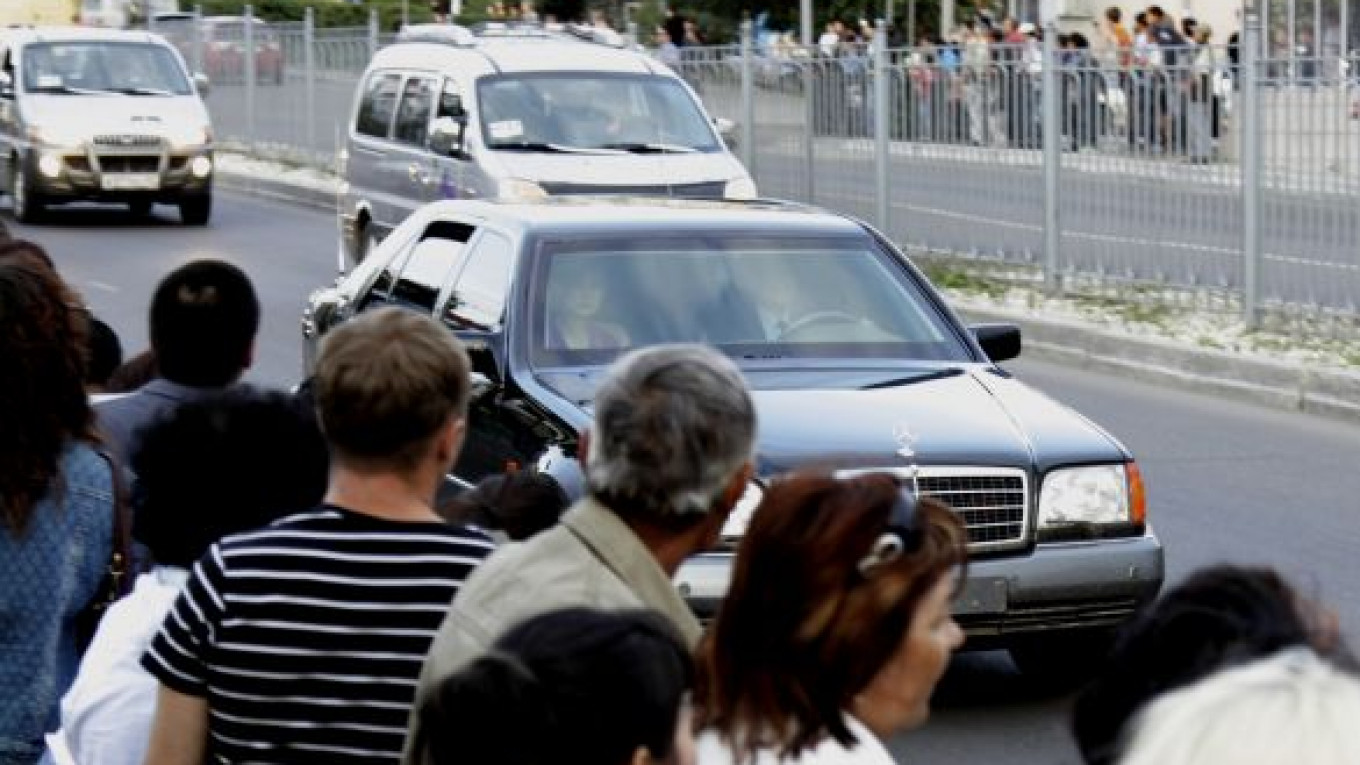North Korean leader Kim Jong Il on Tuesday took a dip in water from the world's largest freshwater lake and visited an aircraft factory in eastern Siberia, leaving his armored train en route to meet with President Dmitry Medvedev.
The North Korean leader stepped out of his train in Ulan-Ude, the capital of Buryatia, a Buddhist province near Lake Baikal, early Tuesday. His motorcade soon left for a picturesque village on the shores of Baikal.
Kim took a two-hour Baikal tour on a yacht guarded by two North Korean boats, the Inform Polis Online web site reported quoting eyewitness accounts. The water in Baikal is ice-cold even in summertime, so Kim had to take a swim onshore — in a pool filled with Baikal water. The speaker of Buryatia's legislature joined Kim in the swim, the news web site reported.
On the shore, the North Korean leader was treated to traditional Buryat food including meat dumplings and Baikal fish prepared over an open fire.
Later Tuesday, Kim went back to Ulan-Ude to visit a major aircraft factory, which among other things produces Sukhoi attack planes, Itar-Tass reported from the plant.
Kim is expected to meet Medvedev on Wednesday for talks that could focus on a natural gas pipeline deal. The pipeline would stream Russian natural gas through the North's territory to the South. South Korean media said the North could earn up to $100 million every year, but negotiations have not reported much progress because of a standoff over North Korea's pursuit of nuclear weapons.
The JoongAng Ilbo newspaper, however, raised worries Monday that the North could abruptly shut down the gas supply if relations deteriorated with the South.
The North Korean leader's visit is shrouded in mystery. A few people managed to take photos of Kim at his previous stop on Sunday, but heavy police cordons kept the media and onlookers in Ulan-Ude away from the train station and the adjacent square.
Anna Ogorodnik, a photographer from Ulan-Ude, said by phone that nearby streets were full of riot police. The station square looked clean and deserted after authorities had tugged away cars and local buses.
The windows of the station building overlooking the tracks were plastered with sheets of paper and station employees had been ordered to stay indoors, Ogorodnik said.
The photographer said she had been detained after trying to take pictures. She was released after she had presented her journalist ID.
The station square remained cordoned off, and Kim's train was still at the station, Ogorodnik said.
It is Kim's first visit to his country's Cold War ally in nine years.
Russian military officials arrived in the North Korean capital on Monday for a five-day visit. The Russian Defense Ministry said the talks would focus on the renewal of military cooperation between the countries, possible joint exercises "of a humanitarian nature" and an exchange of friendly visits by Russian and North Korean ships, Itar-Tass reported from Pyongyang.
The itinerary for Kim's visit, expected to last about a week, has been largely kept secret because of what appear to be high-security concerns from North Korea.
United Grain Co., Russia's state grain trader, sent its first shipment of 3,560 metric tons of milling wheat to North Korea as humanitarian aid, Bloomberg reported Tuesday. The ship arrived at the North Korean port of Hynnam from Vladivostok on Aug. 20 as the first of several shipments of 50,000 tons of wheat from Vladivostok and Novorossiysk.
A Message from The Moscow Times:
Dear readers,
We are facing unprecedented challenges. Russia's Prosecutor General's Office has designated The Moscow Times as an "undesirable" organization, criminalizing our work and putting our staff at risk of prosecution. This follows our earlier unjust labeling as a "foreign agent."
These actions are direct attempts to silence independent journalism in Russia. The authorities claim our work "discredits the decisions of the Russian leadership." We see things differently: we strive to provide accurate, unbiased reporting on Russia.
We, the journalists of The Moscow Times, refuse to be silenced. But to continue our work, we need your help.
Your support, no matter how small, makes a world of difference. If you can, please support us monthly starting from just $2. It's quick to set up, and every contribution makes a significant impact.
By supporting The Moscow Times, you're defending open, independent journalism in the face of repression. Thank you for standing with us.
Remind me later.






